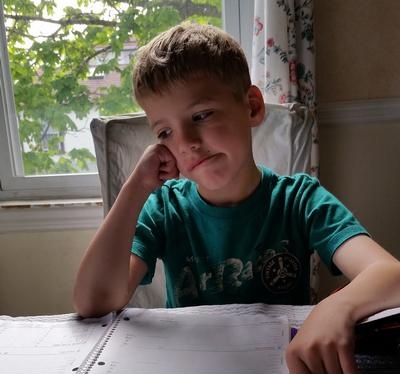|
 Every year tens of thousands of boys and girls sit down at their desks for the first time. Some quickly and easily adapt to school requirements, while others have a longer and more difficult stage of adaptation to new conditions. Every year tens of thousands of boys and girls sit down at their desks for the first time. Some quickly and easily adapt to school requirements, while others have a longer and more difficult stage of adaptation to new conditions.
But several months pass, and already almost all first-graders feel confident enough, they are coping well with the school curriculum.
There are very few of those who could not afford it. But they are - alas! - there is.
The reasons for the lag in studies are, of course, very different. In younger schoolchildren, academic failure is very often associated with a violation of the general physical condition caused by either previous acute diseases, or chronic ones, even such as, for example, banal tonsillitis.
In recent years, children with temporary developmental delays have attracted the attention of doctors and teachers. These delays, as a rule, are the result of prematurity, birth trauma, and frequent illnesses in early childhood. Such children usually begin to walk, talk a little later than their peers, and are low in weight and height. But their lag is especially noticeable towards the end of preschool age.
Child development is a complex process characterized by periodicity and a certain unevenness in the formation of individual mental functions. At each new age stage, the child develops properties that are qualitatively different from those that were characteristic of the previous one.
Between the ages of one and three years, for example, there are major shifts in movement and speech development. By the end of the third year, the child's vocabulary reaches 1000 words. The development of speech plays an extremely important role in communication with other children and adults, cognition of the world around, and improvement of thinking.
By the older preschool age, the child has already formed an attitude towards the situation, elements of a critical attitude towards himself, the ability to control his behavior, suppressing impulsive desires. It is precisely this emotional-volitional sphere that basically lags behind in children with developmental delays. They come to school unprepared for learning, mainly due to the insufficient maturity of the personality components that determine their behavior and attitude to learning.
 In class such children behave very directly; during the lesson, they are not included in the general work, and if it is possible to attract them, then at the slightest difficulty they give up what they have begun - they start playing with counting sticks, draw faces in notebooks, take toys out of portfolios. They can get up in the middle of the lesson and start walking around the classroom, tell the teacher that they don't want to read or write now, but want to play. In class such children behave very directly; during the lesson, they are not included in the general work, and if it is possible to attract them, then at the slightest difficulty they give up what they have begun - they start playing with counting sticks, draw faces in notebooks, take toys out of portfolios. They can get up in the middle of the lesson and start walking around the classroom, tell the teacher that they don't want to read or write now, but want to play.
These children are also characterized by other properties inherent in a younger age: special mobility, excess and some randomness of movements. Such motor excitability makes them extremely restless, undisciplined. The "uncontrollability" of movements is especially clearly manifested when a purposeful activity is required from the child - in the lessons of writing, drawing, manual labor.
Although the mental capacity of these children is usually quite normal, they still lag behind the development of some of the more complex forms of thinking. It is especially difficult for them to understand the relationship between general and particular concepts, to establish a connection between parts of the memorized material. Moreover, these difficulties are explained mainly by increased distraction, inability to think about the proposed task, to focus on it.
The developmental delay can be very pronounced, or it can be insignificant. Depending on this, but to an even greater extent on the conditions in which the child is brought up, the delay can be overcome, or it can be aggravated.
Such a child requires special attention and help. But what kind of help should it be? Prepare lessons for him? Continuously prompting him? No. The Other is necessary - to patiently organize his work, patiently accustom him to independent thinking.
Given the rapid fatigue of such children, do not force the child to sit at work for a long time. If in 25 - 30 minutes it was not possible to complete the task, take a break, give the child the opportunity to rest, move, spend a "physical education".
It is necessary to teach self-control without unnecessary rigor and edification, in a form close to a game: what mark would you give yourself? Why not a top five? Four?
Play, by the way, occupies a large place in a child's life and can be best used to bridge the gap. We would like to address this advice not only to parents of first graders, but also to those whose children are just preparing to enter school.
After all, in every game there are rules that the child must follow. This is how the ability to subordinate one's behavior to the requirements of the teacher is gradually developed, and volitional qualities that are so necessary in the learning process are formed. Take a closer look at how your children play!
In kindergartens, pupils of older groups are now specially prepared for school. In a family, however, a six or seven-year-old child is often treated like a fool. Therefore, the traits of his immaturity can go unnoticed, coming to light only when the child crosses the threshold of school.
It is very important to instill in children a sense of responsibility for the assigned task - be it some small task around the house, caring for a puppy, or playing a certain role in a game.
 Moreover, it is necessary to achieve not only diligence, but also interest in the results of their own work, readiness and ability to overcome obstacles. Moreover, it is necessary to achieve not only diligence, but also interest in the results of their own work, readiness and ability to overcome obstacles.
Very often children in school are hampered by imperfect motor skills, especially the fuzziness of small movements. Such favorite activities as drawing, modeling from plasticine help to develop them. Teach tomorrow's student to manual labor, teach him how to handle paints, glue, scissors, a needle, carefully cut out of paper, make simple applications.
Specialists studying the reasons for the failure of primary schoolchildren note that, in addition to mental retardation, various deviations in the development of hearing and speech are often the source of troubles.
You should know that for the normal formation of speech, the so-called phonemic hearing is required, that is, the ability to clearly differentiate the sounds of human speech.
Children with severe phonemic hearing impairments poorly understand other people's speech and speak poorly themselves. These disorders, of course, become apparent early, and such a child is placed in a special school. But parents may not know about minor violations, and sometimes teachers do not even know about them. And it is difficult for a child to read and write, he persistently makes seemingly inexplicable mistakes: instead of "September" he writes "September", instead of "linden" - "liba".
Defects in phonemic hearing make it difficult to distinguish between voiced and deaf, hissing and hissing sounds, making it difficult to learn to read and write. But in such easy cases, they are surmountable, if, of course, the teacher and parents who have received advice will individually deal with the child. speech therapist.
Children with visual impairments also experience learning difficulties. Again, when these disorders are overt, action is usually taken, and minor violations often go unnoticed.
Developmental delay, physical disability, visual and hearing imperfections, and other disorders that prevent a child from learning successfully can be corrected. You just need to unite the efforts of a teacher, doctor, parents, show a lot of patience, attention, love for the little person.
M. S. Pevzner
|
 Every year tens of thousands of boys and girls sit down at their desks for the first time. Some quickly and easily adapt to school requirements, while others have a longer and more difficult stage of adaptation to new conditions.
Every year tens of thousands of boys and girls sit down at their desks for the first time. Some quickly and easily adapt to school requirements, while others have a longer and more difficult stage of adaptation to new conditions. In class such children behave very directly; during the lesson, they are not included in the general work, and if it is possible to attract them, then at the slightest difficulty they give up what they have begun - they start playing with counting sticks, draw faces in notebooks, take toys out of portfolios. They can get up in the middle of the lesson and start walking around the classroom, tell the teacher that they don't want to read or write now, but want to play.
In class such children behave very directly; during the lesson, they are not included in the general work, and if it is possible to attract them, then at the slightest difficulty they give up what they have begun - they start playing with counting sticks, draw faces in notebooks, take toys out of portfolios. They can get up in the middle of the lesson and start walking around the classroom, tell the teacher that they don't want to read or write now, but want to play. Moreover, it is necessary to achieve not only diligence, but also interest in the results of their own work, readiness and ability to overcome obstacles.
Moreover, it is necessary to achieve not only diligence, but also interest in the results of their own work, readiness and ability to overcome obstacles.








